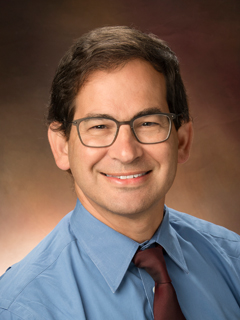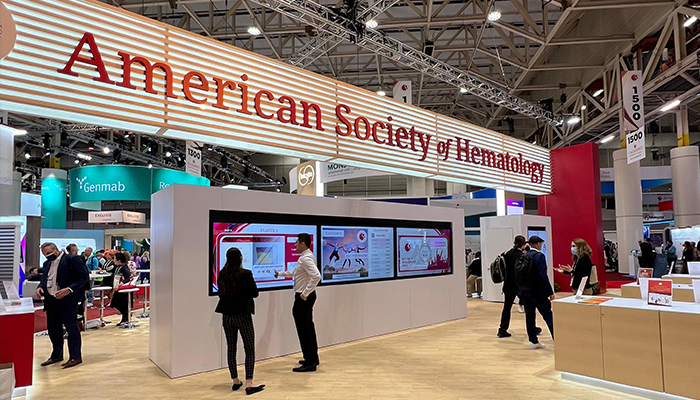HOW CAN WE HELP YOU? Call 1-800-TRY-CHOP
In This Section
MIS-C, Antibody Treatment for Eosinophilic Esophagitis, ASH 2022

The first research news roundup of 2023 is here! As you settle back into your post-holiday routine, stay up to date on our research headlines. This week, we’re featuring research on COVID-19 vaccine safety and MIS-C, antibody treatment for eosinophilic esophagitis (EoE), and research highlights from the many CHOP physicians and scientists participating at the 64th American Society of Hematology Annual Meeting & Exposition (ASH).

Matthew Elias, MD
COVID-19 Vaccine Appears Safe for Children With History of MIS-C
COVID-19 vaccination appears safe for children with a history of multisystem inflammatory syndrome in children (MIS-C), a rare, severe inflammatory response that occurs a few weeks after SARS-CoV-2 infection, according to a multisite study co-led by CHOP researchers. Published in JAMA Network Open, the findings showed patients with a history of MIS-C who received a vaccine at least 90 days after diagnosis reported no serious complications, with no incidence of myocarditis or recurrent MIS-C.
The investigators reached out to vaccine-eligible patients enrolled in the NIH–sponsored multicenter study, Long-Term Outcomes After the Multisystem Inflammatory Syndrome in Children (MUSIC). Study participants were at least 5 years old, at least 90 days from a MIS-C diagnosis, and answered questions about their COVID-19 vaccination status and adverse reactions.
Of 385 patients surveyed, 48% received at least one vaccine dose. Among this group, patient-reported adverse reactions were mild. Arm soreness and fatigue were the most common reactions, which were similar to reactions in the general population. There were no diagnoses of myocarditis or recurrent MIS-C, and none of the patients who had reactions needed medical testing or hospitalization.
“We are very reassured by the results,” said Matthew Elias, MD, first author on the study and an attending cardiologist in the Cardiac Center at CHOP. “This safety data should be comforting to families and healthcare professionals when considering and recommending vaccination.”
Learn more about the study in this NIH news release and in CHOP News.

Jonathan Spergel, MD, PhD
Antibody Treatment Improves EoE Symptoms and Pathology in Young Adults
A study involving an international group of researchers, including co-author Jonathan Spergel, MD, PhD, chief of the Allergy Section at CHOP, found that a weekly dose of dupilumab, a monoclonal antibody, led to a reduction of symptoms and tissue improvement in young adults and adolescents with EoE, a chronic allergic inflammatory disease of the esophagus. The New England Journal of Medicine published the clinical trial findings.
Researchers assessed the efficacy and safety of dupilumab in patients 12 years and older, with the treatment administered weekly or every two weeks, compared to a placebo. They found that 300mg of dupilumab given subcutaneously every week reduced symptoms and improved histologic outcomes, whereas a dose every other week improved histologic outcomes but did not improve symptoms.
“The results of this phase 3 trial give hope to patients and families who have historically had limited options to treat EoE,” Dr. Spergel said. “This study shows that dupilumab is a good treatment option for patients with EoE and not only reduces symptoms but also targets the root cause of the disease.”

Strong CHOP Contribution and Presence at Premier Hematology Conference
Nearly 50 faculty, staff, and trainees from the Division of Hematology and Division of Oncology, and multiple team members from the Novel Therapeutics for Bleeding Disorders (NoT Bleeding) Program attended the ASH Meeting held in New Orleans in December.
CHOP experts were presenting and contributing authors to more than 200 posters and talks at the national conference, which included these conference highlights:
- Regina Myers, MD, and Stephan Grupp, MD, PhD, presented data from a phase 1 study analyzing a novel, anti-CD22 CAR T-cell product (CART22-65) for B-cell acute lymphoblastic leukemia (B-ALL). The findings provide support for a combined CD19/22-targeted approach using the CART22-65s construct in children and young adults who experienced relapse with CD19-antigen loss following treatment with CD19-directed immunotherapy. The study showed the new construct induced remissions in 77% of patients with highly refractory, CD19-negative B-ALL, including in 80% of patients with disease that was refractory to prior treatment with the CD22-directed therapy, inotuzumab.
- David Teachey, MD, was senior author on an abstract highlighted during “Best of ASH” that provided a genomic characterization — and identified genomic predictors — of relapse or refractory disease in T-cell acute lymphoblastic leukemia (T-ALL). Through whole genome, exome, and transcriptome sequencing of more than 1,300 patients enrolled in a Children’s Oncology Group trial for ALL, the researchers identified 16 T-ALL subtypes, several of which were previously unrecognized, and linked those subtypes with prognosis. They also made the novel observation that in more than 55% of patients, the primary oncogenic driver resides in the non-coding or intergenic regions, demonstrating the importance of whole genome sequencing in T-ALL. ASH organizers highlighted the abstract as an example of how large-scale genetic studies can change practice and how team science is important to advance the field.
Other CHOP experts sharing their research were Denise Sabatino, PhD, who presented data on a novel factor VIII variant that produces higher levels of clotting factor and could potentially increase the efficacy of gene therapy for hemophilia A. Sarah Tasian, MD, presented data from a phase 2 study of ruxolitinib with chemotherapy in children with Philadelphia chromosome-like acute lymphoblastic leukemia. Rodney Camire, PhD, was senior author on an abstract that analyzed the use of an antibody targeting human clotting factor V as a way of treating hemophilia. Amaliris Guerra, PhD, shared the first pre-clinical data related to the combination of two drugs to treat beta thalassemia. Stefano Rivella, PhD, and Laura Breda, PhD, each presented abstracts related to the use of lipid nanoparticles as vehicles to treat or better model hematologic disease.
Additional physicians and scientists who presented at ASH were Lindsey George, MD, leader of the NoT Bleeding Program and director of Clinical In Vivo Gene Therapy; Benjamin Samelson-Jones, MD, PhD; Bhavya Doshi, MD; Leslie Raffini, MD, MSCE, medical director of the Hemostasis and Thrombosis Center; and Hilary Whitworth, MD.
Learn about all of the presentations by CHOP researchers on our CHOP at ASH page.
ICYMI
Catch up on our headlines from our Dec. 23 In the News:
- Dimitrios Monos, PhD, Honored for Immunogenetics Work
- Karen Puopolo, MD, PhD, Recognized for Mentorship
- Children with Low-Risk Thyroid Cancer Can Skip Radioactive Iodine
Keep up with our news, stories, and updates in real time by following us on Twitter, LinkedIn, or Instagram. Or subscribe to our newsletter, Research Insider, to get an email sent every other Friday by signing up here.


